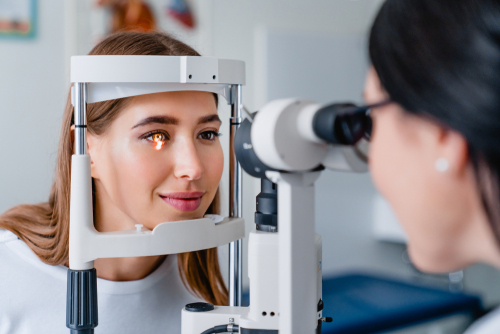Posted by: Associates in Ophthalmology (NJ) in Eye Health

Regular eye exams are crucial to maintaining healthy vision and detecting potential eye problems early on. However, many people neglect them due to various reasons, such as the cost or time commitment involved.
Detecting and preventing eye diseases, updating your prescription, and providing peace of mind are just a few benefits of regular eye exams. Keep reading to learn how often you should schedule an eye exam, so you can take proactive steps toward maintaining your eye health!
Do I Need Regular Eye Exams?
Regular eye exams are an important part of maintaining overall health. However, some may believe they only need to visit an eye doctor if they experience vision problems or discomfort.
In some cases, people may be concerned about the cost or time commitment involved. One of the most important reasons to have regular eye exams is to detect and prevent eye conditions.
Many eye conditions, such as glaucoma, cataracts, and macular degeneration, have no symptoms in their early stages. This means that without a comprehensive eye exam, these eye conditions may go unnoticed until they have already caused significant vision changes.
By catching these conditions early, an eye doctor can provide early treatment and potentially prevent or slow the progression of the disease.
Another benefit of regular eye exams is that they can help to update your glasses or contact lens prescription.
As you age, your vision can change, and a new prescription can help to improve your quality of life. Wearing outdated or incorrect prescription glasses or contacts can cause eye strain, headaches, and other uncomfortable symptoms.
Finally, regular eye exams can provide peace of mind. By knowing that their eyes are healthy, a person can have confidence in their vision and overall well-being.
Additionally, for those with a family history of eye disease or other vision problems, regular eye exams can help to ease concerns and provide a proactive approach to maintaining eye health.
What Can I Expect During an Eye Exam?
During an eye exam, your eye doctor will ask you about your medical history and symptoms, test your visual acuity and prescription, check your eye muscle and coordination, measure your eye pressure, and possibly perform a dilated eye exam. Typically, an eye exam takes around thirty to sixty minutes and is comfortable and non-invasive.
Your eye doctor will explain each test as it’s performed and answer any questions you may have. By scheduling regular eye exams, you can ensure that your eyes are healthy and that any problems are detected and treated early, improving your overall eye health and quality of life.
How Frequently Should I Schedule Eye Exams?
The frequency with which you should schedule eye exams depends on various factors, including age, medical history, and overall eye health. Here are some general guidelines to help you determine how often you should schedule eye exams:
Children
Children should have their first eye exam at around six months, followed by another exam at age three and before starting school. After that, children should have annual eye exams or as recommended by their eye doctor.
Adults
For adults with no known eye conditions or risk factors, it’s recommended to have an eye exam every one to two years. However, if you have a family history of eye disease or other risk factors, such as diabetes or high blood pressure, you may need more frequent exams.
Seniors
As we age, the risk of developing eye conditions increases. Seniors over the age of sixty should have eye exams every year or as recommended by their eye doctor.
It’s important to note that these are general guidelines, and your eye doctor may recommend a different schedule based on your individual needs. If you notice any changes in your vision or experience any symptoms such as blurry vision, eye pain, or redness, you should schedule an appointment with your eye doctor as soon as possible.
Is it time for you to have an eye exam? Schedule an appointment at Associates in Ophthalmology in Livingston, NJ, today!

